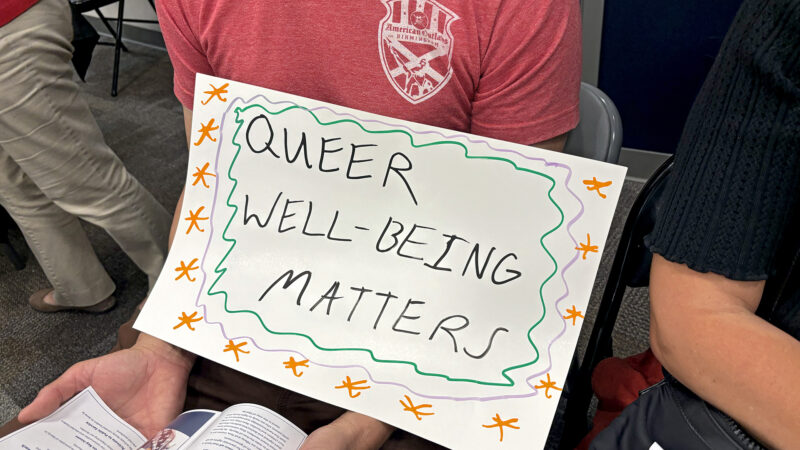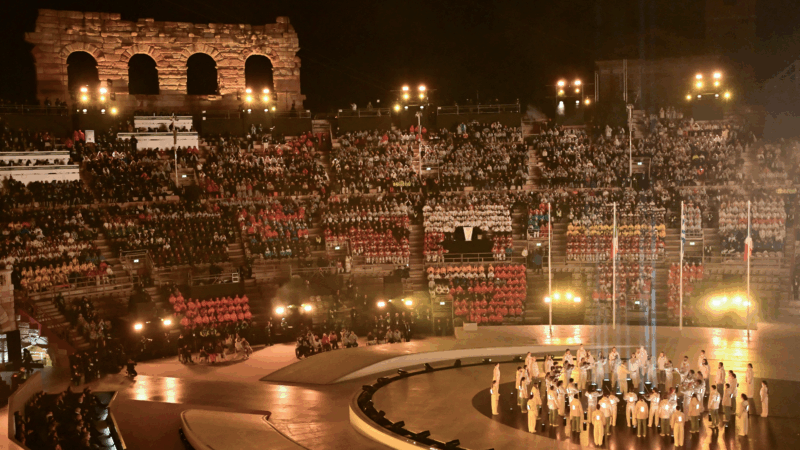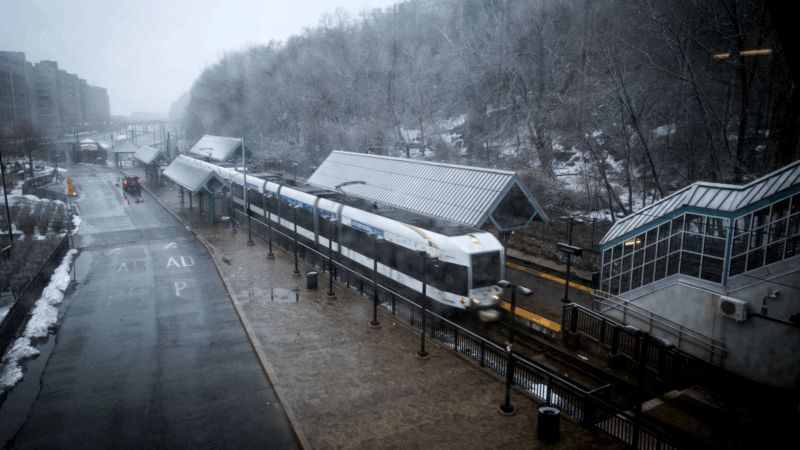‘A terrible experience’: LGBTQ+ students face challenges amid Alabama’s Title IX, sports ban debate
An LGBTQ+ advocate holds a sign that reads “Queer well-being matters” during a Moms For Liberty town hall meeting on Title IX at the North Shelby County Library in Pelham, Alabama, on July 1, 2024.
River Rooks recently graduated from high school in Alabama and ran into difficulty when looking for a college to call home.
Rooks, who is non-binary and uses “ze/zir/zirs” or “they/them/theirs” pronouns, didn’t want to live with a male roommate and had difficulty getting accommodations wherever they applied.
“Some of my worst moments have been when I’ve been at camp and been forced to sleep in dorms with other men or with other boys,” Rooks said, “It’s just a terrible experience and I feel terribly uncomfortable.”
In April, the Biden-Harris administration introduced new rules to broaden the scope of Title IX, which could’ve helped Rooks with their college search. One of the new rules would protect transgender and other LGBTQ+ students from discrimination, but the Supreme Court blocked its enforcement in August.
This summer, amid all the rule-changing turmoil, Rooks went to a town hall about the new Title IX changes hosted by the conservative political group Moms For Liberty at the North Shelby County Public Library. Alabama Attorney General Steve Marshall, one of the featured speakers at the town hall, helped file the lawsuit that led to the Title IX rule changes being blocked. Twenty-five other states, mostly in the South, joined the suit.
Rooks and other LGBTQ+ supporters in attendance were outnumbered, with many in the crowd opposed to adding protections for transgender students — particularly, when it comes to transgender athletes participating in organized sports.
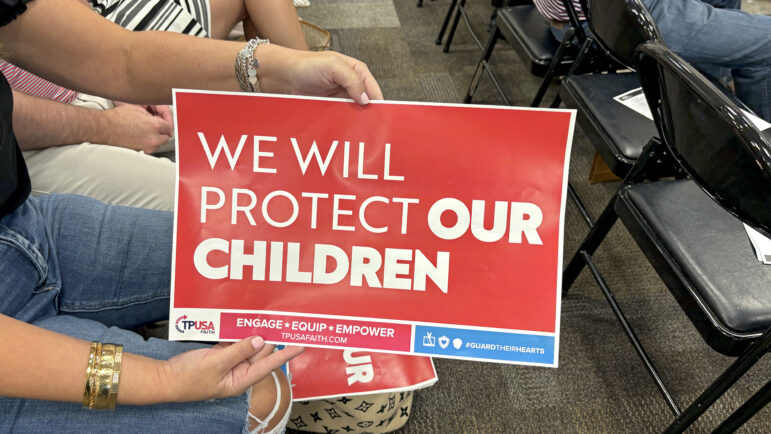
“As a 47-year-old woman, I lived through the development of Title IX, which provided fairness in sports for girls and women. It took decades,” Heather Stuckey said. “Feminists worked for it tirelessly [and] over the last two years, it has been absolutely destroyed.”
Stuckey said she has a daughter in high school who competes in track and field and is worried about how the new rules would affect her.
“I need someone to explain to me why it would in any way make any sense for her to have to compete in a race against a biological male,” she said.
This pushback against transgender athletes occurred after the National Association of Intercollegiate Athletics, which governs nearly 250 small and private universities across the U.S., implemented a ban on trans women competing in women’s sports in April, just before the new Title IX rules were announced.
At the town hall, Marshall said he wasn’t aware of the NAIA ban when it was enacted, but he agrees with it, calling it “appropriate and consistent with what we’ve done in Alabama.”
In 2021, Alabama banned transgender students from competing in high school athletics, even though the Alabama High School Athletic Association said it wasn’t aware of any trans athletes ever competing in the state. In 2023, Alabama extended its ban on trans athletes to include public colleges and universities.
Marshall said the laws were made to set a precedent.
“We’ve seen it going around the country,” he said. “This makes the public policy of the state of Alabama very clear so we ensure that it doesn’t happen.”
Alabama Republican U.S. senators Katie Britt and Tommy Tuberville called for the NCAA to do the same as the NAIA in a recent letter. During the 2024 Summer Olympics, both politicians participated in misgendering female Algerian boxer Imane Khelif on social media.
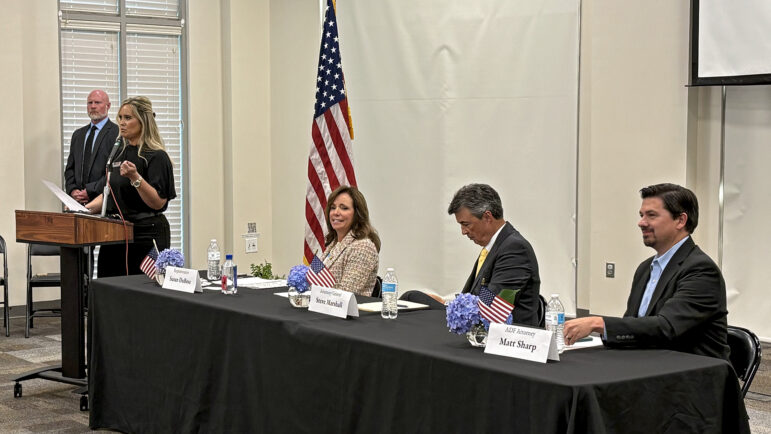
Not everyone agrees with this hard stance against transgender athletes, though.
The Southern Poverty Law Center has publicly criticized the NAIA ban, and the ACLU is advocating for the nationwide implementation of Title IX changes.
LGBTQ+ advocates at the library town hall were also vocal that trans people in sports deserve protection. Rooks and other volunteers handed out counterargument pamphlets at the public library before being told to stop by Moms For Liberty organizers.
“I have a very close trans friend who, like I said, you’re in school and it has been a really terrible experience for us. We talk about sports and she can’t even think about it,” Rooks said.
Rooks said they gained some hope regarding Title IX after Vice President Kamala Harris became the Democratic nominee to run for president, but it’s frustrating to see conservatives attack their community and not have the power to fight back.
Rooks was considering attending the University of Alabama at Huntsville this fall, but they’ve decided to take a gap year and are continuing to advocate for the LGBTQ+ community in Alabama.
“If you’re trans and don’t have a supportive family or are not out publicly, there are still spaces for you,” they said. “The Magic City Acceptance Center has been my refuge. There are queer spaces all over the country.”
Several organizations that advocate for transgender individuals declined to comment on this story, with one group citing fear of putting kids in harm’s way.
Rooks and other local activists and allies are calling for action to end the negative and violent rhetoric surrounding the transgender community.
This story was produced by the Gulf States Newsroom, a collaboration between Mississippi Public Broadcasting, WBHM in Alabama, WWNO and WRKF in Louisiana and NPR.
Newly discovered dinosaur species was a fish-eater with a huge horn
The semi-aquatic dinosaur, Spinosaurus mirabilis, was discovered by an international team of scientists working in Niger.
Reporters’ notebook: The Olympics closing ceremony is way more fun than you’d think
Olympics opening ceremonies tend to get more love than their closing counterparts. But a pair of NPR reporters who watched both in Italy left with a newfound appreciation for the latter.
Northeast readies for a major winter storm, with blizzard warnings in effect
New Jersey through Massachusetts could see 2 feet of snow. New York City's mayor said the city had not "seen a storm like this in a decade."
Mexican army kills leader of Jalisco New Generation Cartel, official says
The Mexican army killed the leader of the powerful Jalisco New Generation Cartel, Nemesio Rubén Oseguera Cervantes, "El Mencho," in an operation Sunday, a federal official said.
Ukraine’s combat amputees cling to hope as a weapon of war
Along with a growing number of war-wounded amputees, Mykhailo Varvarych and Iryna Botvynska are navigating an altered destiny after Varvarych lost both his legs during the Russian invasion.
University students hold new protests in Iran around memorials for those killed
Iran's state news agency said students protested at five universities in the capital, Tehran, and one in the city of Mashhad on Sunday.

